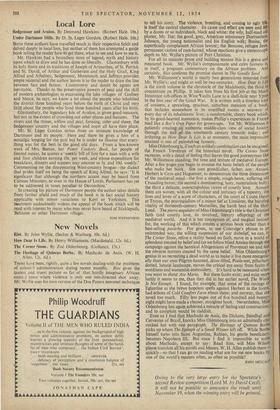New Novels
Riot. By John Wyllie. (Seeker & Warburg. 10s. 6d.) The Heritage of Quinces Borba. By Machado de Assis. (W. H. Allen. 12s. 64:1.)
THERE have been, rightly, quite a few novels dealing with the problems of coloni l administration during recent months. Riot gives the tautest and truest picture so far of that hardly imaginary African coast:;1 town where violence is only one mis-directed shot away. Mr. Wyllie uses his own version of the Dos Passos newsreel technique
to tell his story. The violence, breeding, and coining to ugly life, Is itself the central character. Its cause and effect are seen and fell by a dozen or so individuals, black and white: the wily, half-mad old plotter, Mr. Tee; the good, grey, American missionary Dortweilers; Johnson, the young nationalist and his English wife; Busisa, the superficially complaisant African lawyer; the Bensons, refugee JeWs, permanent victims of race-hatred, whose reactions give a stereoscopic depth to Mr. Wyllie's picture of Port Christian.
For all its staccato prose and building tension this is a grave and measured book. Mr. Wyllie's compassionate and calm fairness is, in itself, a poignant commentary on the African problem. And certainly, Riot confirms the promise shown in The Goodly Seed.
Mr. Williamson's world is nearly two generations removed l'iom Mr. Wyllie's; and might as well be two centuries. How Dear Is is the ninth volume in the chronicle of the Maddisons, the third to concentrate on Phillip. It takes him from his first job at the moon Insurance sub-offices in Wine Vaults Lane to a shell-hole near Ypres In the first year of the Great War. It is written with a timeless kind of cosiness, a sprawling, spacious, suburban mansion of a book, that includes somewhere in its overfilled rooms a souvenir Of every day of its inhabitants' lives; a comfortable, cheery book which, by its good-hearted innocence, makes Phillip's experiences in France read like a Boy's Own Paper for grown-ups. Yet Mr. Williamson is patiently creating an authentic middle-class view of social history through the end of the nineteenth century towards today; and irritating as How Dear Is Lift is at moments, the main impression retained is one of painstaking honesty. Miss Oldenbourg is, if such an unlikely combination can be imagined, the French Trevelyan of the historical novel. The Corner Slone recreates, with a detail of feeling that leaves the good journeyman like Mr. Williamson standing, the tone and texture of mediasval Europe. After a few piges you begin to assume the basic beliefs of the people who make her book. She uses grandfather, father, son: Ansiao, Herbert lc Gros and Haguenier, to demonstrate the three dimensions of the medireval mind—the first a simple, rough-hewn, suffering old Crusading baron; the second a domineering, lusty, materialistic bully; the third a delicate, overscrupulous victim of courtly love. Around them are woven, with all the colour and intricacy of a tapestry, the, lives and loves of a score of characters, of the court of Count Henri at Troyes, the provincialism of a minor fief at Linnieres, the bursting vitality of thirteenth-century Marseilles, the harsh heat of the Holy Land. The pierre angulaire of Miss Oldenbourg's title is the Christian faith (arid courtly love, its involved, literary offspring) of the mediieval world. And it is her conception of, and magical instinct for, the working of this which creates a serious book rather than a best-selling pastiche. For given, to use Coleridge's phrase in all unintended way, the willing suspension of our disbelief, we can, in, The Corner Stone, relive a reality based on faith, move in a world 01 splendour created by belief and (as we follow blind Ansiau through the campaign against the heretical Albigensians of Provence) see and feel the obverse horrors created by the same belief. Miss Oldenbourg's genius in so recreating a dead world as to make it live more energetic' ally than our own Pilgrim-haunted, decor-filled, Pools-wet, pillarbov dotted, lunatie landscape, moves the critical eye Away from faults of wordiness and womanish embroidery. It's hard to be measured when you want to shout Ave Maria. But these faults exist; and exist more lushly it seems to me, than they did in her earlier novel, The World Is Not Enough. I found, for example, that some of the ravings of Eglantine as she brews hopeless spells against Herbert in the forest, had echoes of Cold Comfort Farm about them; and anyway, that she raved too much. Fifty less pages out of five hundred and twenty- eight might have made a cleaner, straighter book. Nevertheless, Miss Oldenbourg has again achieved a miracle of feeling and construction;' and to complain would be caddish. Even so I find that Machado de Assis, the Dickens, Stendhal and Cervantes of Brazil, knocks Miss Oldenbourg into an admittedly chic cocked hat with one paragraph. The Heritage of Quincas Borba picks up where The Epitaph of a Small Winner left off. While Borba himself turns into Saint Augustine, Rubiao, his gentle beneficiarY• becomes Napoleon III. But since I find it impossible to write about Machado, except to say: Read him, will Miss Wilson please translate all his novels and Messrs. W. H. Allen publish them—. quickly—so that I can go on reading what are for me new books bY one of the world's masters often, as often as possible?
JOHN METCALf


































 Previous page
Previous page